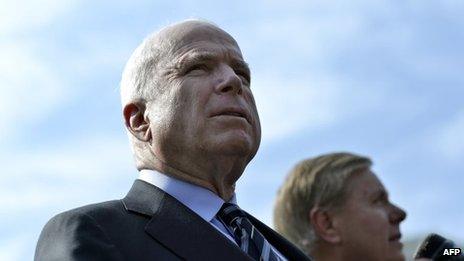Syria crisis: Congress doubts over Obama's strike plans
- Published

Senator McCain has warned that America's credibility in the world is at stake over its response to Syria
They call it "flooding the zone". That is White House-speak for their intense lobbying of members of Congress before next week's vote.
It's Labour Day but they can't stop laboring to avoid a "no" vote. It would be a huge and profoundly important humiliation for the president.
After meeting the president, John McCain sounded as though he was almost persuaded - he has long been for military action but thought the president didn't have a proper plan. He can now see the glimmers of one.
Mr McCain set out what was at stake - a "no" vote would be a catastrophe and shred America's credibility in the world.
Given that, I asked, him wasn't he bound to vote yes? He said that a weak response was worse than nothing at all.
But it is clear he's moving towards supporting the president, and that will influence others.
A phone call between some of Mr Obama's top people and more than 100 Democrats was apparently acrimonious at times, external with one politician saying that they had collective amnesia - they had forgotten Vietnam and Iraq.
John Kerry, in reply, apparently called it America's "Munich moment"- a reference to [UK Prime Minister Neville] Chamberlain's appeasement of Hitler.
This is strong stuff.
But it points to the central dilemma of Obama's response. No-one seems to believe in what Obama is proposing - very limited strikes. A shot across the bows, as the president called it.
As someone has pointed out, a shot across the bows only works if they believe you might sink the ship.
John McCain, and those in his camp, think you have to go much further and seriously weaken Bashar al-Assad so he has to, at the very least, be forced into considering a political solution without him.
Those in the opposite camp think that is exactly what they want to avoid - stronger and longer American involvement, even if troops on the ground are ruled out.
President Obama's middle way satisfies very few, and the fact of this debate, may change what is being considered.